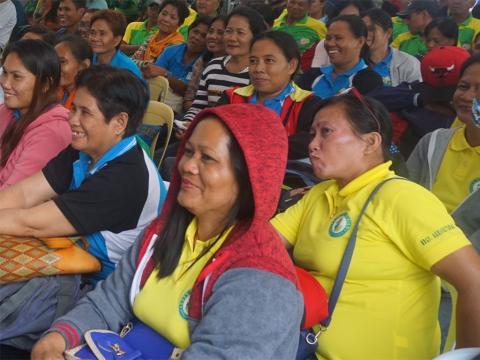Around 500 farmers and other guests from different provinces of Caraga region joined the 6th Barangay Agricultural Workers (BAWs) Congress which was held at the ATI-Caraga Complex, Brgy. Los Angeles, Butuan City last November 16-17, 2017. Photo by: JPDJampac
LOS ANGELES, Butuan City - Rainstorm did not prevent the 6th Barangay Agricultural Workers (BAWs) Congress to take place at the Agricultural Training Institute-Regional Training Center XIII (ATI-Caraga) Complex, last November 16-17, 2017. The said event attracted around 500 farmers, Agricultural Extension Workers (AEWs), and other partners from various government and private organizations. The annual event comprised of sharing of experience, updates, contests, video presentations, election of officers, and awarding of Outstanding BAW.
The ATI-Caraga is the only regional center in ATI who hosts such event which was first celebrated in 2012. It gives honor and importance to notable farmer-leaders who have helped ATI in bringing agricultural programs and technologies to the villages with emphasis on the practice of organic agriculture.
Like in the past years, organic agriculture has been the core of the event. In fact, this year’s congress revolved around the theme, Organic Agriculture: A Science-based, Market-oriented, Adaptive, Responsive, and Transformative (S.M.A.R.T.) Culture.
“The joy that I feel from within is immeasurable upon seeing all of you here today despite the heavy rains. Few words are not enough to express my heartfelt greetings to all of you,” said ATI-Caraga Center Director Robert T. Poculan Jr. who was happy that the event was well-attended and pushed through despite the stormy weather condition.
Among the invited guests were Surigao del Sur Vice Governor, Hon. Manuel Alameda Jr.; former Dinagat Vice Governor, Elvis Dela Merced; Learning Site (LS) and School for Practical Agriculture (SPA) cooperator, Engr. Woodrow Escobal; and representative from the Philippine Crop Insurance Corporation (PCIC), Arthur Alamban.
The ATI National Director, Dr. Luz A. Taposok, who was unable to attend the congress, emphasized in her emailed message to the participants that organic agriculture fights the effect of global warming by reducing carbon dioxide emission through less usage of synthetic fertilizers and sequestering carbon in soil. She further exhorted the farmers to help the government convince the unbelievers that with organic agriculture, yields can increase in the long run through the use of affordable inputs as these are largely based on local biodiversity. Besides these, she added, organic agriculture also helps improve human health and maximizes environmental services.
During the sharing of experience, Dela Merced, who is concurrently an LS cooperator and President of the Magsasakang Siyentista (MS) in Caraga region, shared his experience in utilizing worms as fertilizers. According to him, the technique is safe, effective, and only requires low capital investment. In the end, he thanked ATI for the trainings and exposure trips he attended and the technical and financial support extended by the agency to further develop his farm.
Another guest who shared his inspiring story as a farmer was Engr. Escobal. He expressed his happiness for discovering organic agriculture because it produced him food that is safe, healthy, and tasty. “We should tell farmers not to be too dependent on commercial farm inputs. In organic agriculture, it requires only hardwork,” Escobal quipped.
“My area before was not suitable for farming because it was rocky and was once a small-scale mining site which was later abandoned and eventually became a wasteland. When I acquired it, I looked for ways to bring back the fertility of the soil by planting trees and letting its leaves fall, litter, and decompose. The process provided nutrients and insulation to the soil. Later, I was able to plant different crops and vegetables. Now, I’m opening my farm to the public so that people may see and learn how we can possibly transform a piece of land into something productive,” Escobal explained.
The two-day event was filled with contests which included Best BAW, Mr. and Mrs. BAW, Doble Kara, and Balak. Other activities held were tree planting, crop insurance updates, and election of BAW officers at the municipal, provincial, and regional levels.

